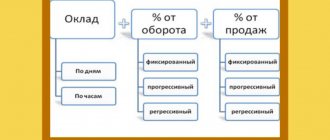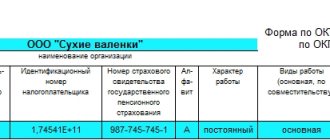It is always pleasant to receive bonuses, and if they are enshrined in regulations as part of the salary, then this pleasure is also the responsibility of the employer. There are frequent lawsuits demanding the payment of the due premium. But there are also disputes that bonus funds were paid illegally: deliberately or by mistake.
Does an employee who unexpectedly receives such a payment need to do something: does something need to be done or is it enough to just quietly rejoice? How should an accountant handle these situations? What will happen as a result with tax payments? Let's look at these questions in the article.
Question: Is it possible to recover from a former director a salary, including a bonus, increased and assigned to himself without the consent of the participants? How to recalculate personal income tax and insurance contributions when collecting this amount? View answer
Why are illegal bonuses tracked?
Payment of bonuses, if they are provided for in the organization, as a rule, is beneficial in its own way to both parties to the employment contract:
- the employee receives additional money, as well as a positive assessment of his work;
- The employer has another lever in his hands to influence staff motivation.
But bonuses cannot be assigned and withdrawn without control. The procedure for their accrual and deduction must be strictly established in the accounting policy. No one can violate it, both in the “minus” direction, that is, depriving the employee of a well-deserved bonus, and in the “plus” direction – paying money without reason.
Question: In accordance with the Regulations on the remuneration of wages, in the event of a disciplinary sanction, a bonus based on the results of work for the month is not accrued or is not accrued in full. The disciplinary offense was discovered in February, and the order to impose a disciplinary sanction was issued in March. For which month is the bonus not awarded to the employee - February or March? View answer
The issue of illegally accrued bonuses worries the inspection authorities for good reason. There are several reasons for interest in such expenditures:
- Assessing the legality of the actions of management who signed the unlawful order to assign this payment.
- Possibility of arrears in income taxes, since the lion's share of premiums reduces its base.
How to recover an unpaid bonus from an employer ?
Deadlines for deprivation of bonus
The period of deprivation of bonuses is the period of time during which the employee will not receive bonuses, even if he deserves them. Since labor legislation does not establish either the procedure for deprivation of bonuses or the terms of deprivation, such a procedure must be clearly regulated by the internal acts of the company.
Internal documents may stipulate various periods during which an employee will lose bonuses. The term can be set depending on the severity of the offense committed (the more serious the violation, the longer the term).
For example, an organization’s internal act may state that if an employee is late for work, he will lose bonuses for a period of one month, and if he shows up to work drunk, he will lose bonuses for six months.
If local acts, collective and labor contracts, agreements do not specify the procedure and terms for depriving bonuses, but state the grounds for bonuses that the employee meets, the employer does not have the right to decide not to pay the bonus the employee deserves. If a well-deserved bonus is not paid, to restore justice, the employee has the right to appeal to the State Labor Inspectorate or to court.
Have a question? We'll answer by phone! The call is free!
Moscow: +7 (499) 938-49-02
St. Petersburg: +7 (812) 467-39-58
Free call within Russia, ext. 453
What the regulations say
If bonuses are included in remuneration for work, there cannot be two interpretations - they are accrued in all cases, regardless of work results, simultaneously with the salary, and this is reflected in the employment contract, in the part where the employee’s salary is negotiated. But the law allows the employer to develop and approve the procedure for bonuses for his staff (Article 191 of the Labor Code of the Russian Federation), so there may be various options, which, of course, do not contradict labor law.
No matter how original the employer strives to be when thinking through the reward system, the internal regulatory act reflecting bonuses must clearly provide answers to the following questions:
- what types of bonuses apply in the company;
- how often and regularly can they be prescribed;
- source of payments;
- who can be rewarded;
- what determines the fact and size of the bonus;
- how exactly should you calculate the due amount;
- Is it possible to deprive and how exactly?
Such a document may be part of the text of a collective agreement or regulations on remuneration; sometimes employers issue a separate Regulation on bonuses.
IMPORTANT! The document must indicate not only the conditions for accrual or cancellation of bonuses, but also justify their legality and the legality of reducing the tax base for profits at their expense (Articles 252, 255 of the Labor Code of the Russian Federation).
If the manager does not want to encourage his employees on an ongoing basis, but plans to do this only in special cases, his order will serve as justification.
Basic Concepts
A bonus is an incentive payment to an employee, which is transferred along with wages or separately from it.
It can be one-time or systematic. When determining the possibility of calculating payments, the employee’s fulfillment or non-fulfillment of his obligations and labor plan is taken into account. Deprivation of bonuses is deprivation of an employee’s bonus according to the Labor Code of the Russian Federation in the event of a disciplinary offense. It may not be paid in full or may be reduced by a certain portion. The measure is a penalty for failure to comply with internal regulations and is not related to disciplinary action.
The award is variable. If there are grounds, management may not pay the funds. In this case, the reasons for the refusal should be reflected in local documentation or regulations on bonuses for employees.
What makes a premium unreasonable?
Tax authorities, when conducting audits, are vigilant about the eligibility of charging bonuses, since this is an important part of reducing the tax burden (as a share of income tax). If the accrual is proven to be unjustified, management will face troubles and additional cash expenses.
What factors testify to the unreasonableness of profits:
- Lack of reinforcement. The manager did not draw up paperwork justifying the fact of the bonus: he did not issue a separate regulatory act, did not include information in the employment or collective agreement, in the regulations on remuneration, and did not issue an individual order.
- Documentary insufficiency. The corresponding act has been drawn up, but it does not specify the key points of the bonus that make it legal, regarding:
- periodicity;
- reasons for payment;
- distribution algorithm;
- calculation methods.
- Duplication. You cannot award bonuses that repeat each other, for example, for the same thing at the end of the quarter and the end of the year.
- "They didn't deserve it." The indicators do not correspond to the declared reasons. For example, bonuses must be issued for exceeding certain figures, but according to accounting, a different result is obtained or the data is corrected.
- "The source is empty." If the bonus is usually calculated from the organization’s profit, it cannot be assigned when accounting losses are recorded.
- "You're not supposed to." Persons who received the award do not meet the parameters reflected in the regulatory documents regarding those entitled to it.
- Order without period. The text of the order assigning a bonus does not contain information about the period for which this is done.
- "Not according to protocol." There are deviations from the order of distribution or frequency of accrual of bonuses recorded in the accounting policy.
- "Cunning calculations." The amount paid does not correspond to the accepted algorithm for calculating bonuses.
- More than the minimum. The manager cannot pay bonuses in excess of a certain limit.
Illegal bonuses to management
If the manager is not at the same time the owner of the organization, his desire to write out the maximum bonus for himself will become understandable. If the owner did not restrict his representative at the company in any way, from the point of view of the law there will be no violations in this. But usually the manager in relation to bonuses is subject to the same standards as the staff. In this case, the bonus to management will be unjustified if:
- for her appointment, the accounting reports were “cleaned up” in order to achieve the required indicators;
- the order was issued in violation of the conditions reflected in the bonus regulations (or other relevant document);
- the amount of the premium exceeds that set by the owner;
- There is a ban on self-rewarding.
Conditions for calculating bonuses to an employee after dismissal
The annual bonus is calculated for a full calendar year. When an accountant calculates remuneration, he must take into account many factors: dismissal at his own request or by agreement of the parties; actual time worked; employee experience.
Upon dismissal of one's own free will: if a person worked well and had no reprimands or fines, the annual remuneration is accrued regardless of whether he quit or not. Incentives are calculated based on the company's performance in the new billing period. The employee has the right to apply to the arbitration court after three months after non-payment of the amount due.
When dismissing by agreement of the parties: this dismissal option is a peaceful agreement between the resigning employee and the manager. You need to draw up a document in which all payments will be spelled out: salary, incentive bonuses, bonuses. If the employee quit before the order for annual compensation was issued, this fact must be stated in the agreement, as well as the procedure for receiving the bonus after dismissal and the amount of the amount.
What are the dangers of an illegal bonus?
For the manager
The person whose guilt and intent in this action is proven must be held accountable for violating the law and regulations. In the case of bonuses, this is the manager who signs the order to pay bonuses to himself or another employee. If the bonus turns out to be illegal, it turns out that the manager’s actions caused material damage to the owner. In this case, he may face various responsibilities:
- compensation to the owner for material loss caused to him (Article 277 of the Labor Code of the Russian Federation);
- dismissal from office at the initiative of the owner (clause 9 of article 81 of the Labor Code of the Russian Federation);
- criminal liability (Articles 159 and 201 of the Criminal Code of the Russian Federation) for abuse of trust or abuse of official authority.
For employee
As for the employee who received bonus funds without sufficient grounds, this is not and cannot be his fault, since the staff is deprived of influence on the levers of labor incentives. This means that the employee not only cannot be punished, but also the bonus paid will not be taken away from him (Article 1109 of the Civil Code of the Russian Federation). If management tries to withhold this amount from the salary, such actions can be challenged, since they are also illegal (Article 137 of the Civil Code of the Russian Federation). The employee should not be responsible for management’s mistakes: there is an order, which means the money must be paid and cannot be recovered because it does not meet the criteria for unjust enrichment.
FOR YOUR INFORMATION! In confirmation of this, there is a judicial precedent in the Supreme Court - Determination No. 18-B10-16 was issued, published in the “Review of Legislation and Judicial Practice of the Supreme Court of the Russian Federation for the second quarter of 2010.”
Labor Code norms
The Labor Code of the Russian Federation does not contain articles that would prescribe the procedure for depriving a bonus. After all, the law provides for only three punishments for disciplinary offenses.
Penalties are reflected in Article 192 of the Labor Code of the Russian Federation and are:
- warning;
- rebuke;
- dismissal.
Cancellation of incentives is not included in this list.
It is recommended not to specify the bonus deduction procedure in local documents. It is worth specifying the conditions under which payment is provided. In such a case, the employee who fails to comply may legally be deprived of payment.
The bonus is calculated in accordance with Article 129 of the Labor Code of the Russian Federation. This document states that if a person is fired, this should not deprive him of the right to receive the compensation he deserves.
Taxation of remuneration after dismissal of an employee
As a rule, bonuses based on the results of work for the reporting period are paid taking into account the fulfillment of established indicators and criteria for assessing labor efficiency. When awarding bonuses, both individual and collective labor results can be taken into account (clause 16 of the Unified Recommendations for the Establishment of Remuneration Systems).
Based on the general rule for assigning and paying bonuses based on work results when the indicators (achievement of labor results) established by the bonus conditions are met, the employer is obliged to pay the bonus. Moreover, this rule applies to all employees who have worked the period for which the bonus is paid.
Bonuses for the quarter and year are included in the remuneration system, since they are paid to the employee for work, that is, for the performance of his job duties, are related to performance results and the achievement of established indicators, and therefore are part of the employee’s salary. Termination of an employment contract with an employer does not deprive employees of the right to receive appropriate incentive payments.
At the same time, it is worth noting that, in addition to the generally accepted rules for paying bonuses based on performance results, the institution has the right to establish by local regulations a special procedure for the appointment and payment of these bonuses. In particular, an institution may include the following features in its bonus regulations: the bonus is not a guaranteed systematic payment and is not included in the mandatory payments.
The purpose of bonuses is to stimulate the stability of the institution’s staff and prevent staff turnover. The employer pays bonuses based on the results of work for the period only to those employees who are in an employment relationship at the time the decision on reward is made, and not to those who were in an employment relationship during the bonus period.
The accrual and payment of bonuses are made exclusively on the terms and conditions specified in the bonus regulations. Under such circumstances, there is no legal basis for the institution to pay performance bonuses to dismissed employees. The institution has the right to refuse to pay bonuses to these employees. Moreover, the court will most likely support the institution in this situation (Appeal ruling of the Primorsky Regional Court dated June 20, 2017 in case No. 33-6115/2017).
In order to avoid legal disputes with former employees, we recommend that institutions establish in local regulations the specifics of paying bonuses after the dismissal of employees, namely: the possibility of paying bonuses, conditions for bonuses, terms and methods of making bonus payments.
In addition to salary for the period worked, compensation for unused vacation, employers can pay certain types of severance pay upon dismissal.
In Art. 178 of the Labor Code states that upon termination of an employment contract due to the liquidation of an organization or reduction of staff, the dismissed employee is paid a severance pay in the amount of average monthly earnings, and he also retains the average monthly earnings for the period of employment, but not more than 2 months from the date dismissals (including severance pay).
The second rule is that in exceptional cases, when submitting a certificate from the employment center, the employer will be obliged to retain the employee’s average earnings for the third month. And if we take the regions of the Far North, then, according to a certificate from the employment center, the employer will be obliged to pay money for the 4th, 5th and 6th month.
We invite you to familiarize yourself with: Order on changing the timing of payment of wages
The norm indicated in Part 1 of Art. 178 of the Labor Code, establishes that when an employee is dismissed due to the liquidation of an organization or a reduction in staff, the accountant must calculate severance pay for the period of employment (the first month after dismissal). In this regard, questions often arise about determining the amount of severance pay. To calculate the average monthly earnings, an accountant should be guided by Decree of the Government of the Russian Federation of December 24, 2007 No. 922.
Convenient service for calculating salaries, calculating sick leave and vacation pay, maintaining accounting records, sending reports via the Internet
Try it now
Art. 178 of the Labor Code prescribes guarantees according to which severance pay is paid in the amount of average monthly earnings for the first month of employment. Let's say an employee quit due to staff reduction on July 14. In this case, the accountant needs to calculate the average monthly earnings for the period from July 15 to August 14.
If the employee was registered under the salary system and there are non-working holidays in the month following the date of dismissal, you need to remember Art. 112 Labor Code: the average monthly salary, when an employee is dismissed due to staff reduction, must be paid not only for working days, but also for non-working holidays that fall during this period.
There is a wealth of judicial practice on this issue. The main argument of the judges is this: with a salary system of remuneration, the mere presence of non-working holidays does not affect the reduction of the salary.
It turns out that when an employee is dismissed due to a reduction in staff, one amount of severance pay must first be paid, unless otherwise provided by industry agreements or collective agreements of the organization. The benefit is paid precisely for the period following the day of dismissal (July 14) - from July 15 to August 14.
If an employee does not find a job in the period from August 15 to September 14, he can come to his former employer on September 15, show his work record book - that he is not employed anywhere, and the ex-employer will be obliged to pay him another severance pay for the second month of unemployment. For the third month, payment of benefits is made in exceptional cases if there is a certificate from the employment center.
Some employers are interested in whether it is necessary to pay benefits to a pensioner who has been laid off. Within the framework of the Labor Code, all workers are equal. The Letter of Rostrud dated 02/11/2010 No. 594-TZ also reminds us of this. If a pensioner provides a certificate from the employment center, then the employer must pay him severance pay.
The average monthly salary for the period of employment is not due to part-time workers, since they have a main job.
Art. 78 of the Labor Code establishes the rule: an employment contract can be terminated at any time by agreement of the parties.
Often, in an effort to avoid the complex procedure of staff reduction, the employer chooses dismissal by agreement of the parties, but with the payment of severance pay. And although the Labor Code does not stipulate anywhere that the employer is obliged to pay severance pay to employees dismissed by agreement of the parties, he can do this by virtue of Art. 178 TK.
Many employers try to make do with one statement from the employee, on which they base the resolution. But it is better, when dismissing by agreement of the parties, to draw up an agreement to terminate the employment contract by agreement of the parties, fixing a number of important issues:
- what date will be the last day of work, that is, the day of dismissal;
- the fact that the employee will be fired precisely under clause 1 of Art. 77 Labor Code, that is, by agreement of the parties;
- what amounts will be paid to him;
- that the parties have no mutual claims, etc.
Typically, such an agreement is drawn up in two copies.
When drawing up an agreement, you should pay attention to the employee’s employment contract. If it does not indicate that if an employee is dismissed by agreement of the parties, he will be paid a certain amount of severance pay, then this condition must be included in the employment contract.
This is done simply: an additional agreement is drawn up to the employment contract, which stipulates the condition for the payment of severance pay in a certain amount.
The Ruling of the Supreme Court of the Russian Federation dated August 10, 2015 No. 36-KG15-5 provides an interesting situation: the employee and the employer agreed that upon dismissal, by agreement of the parties, the employee would be paid severance pay, they drew up an agreement on the termination of the employment contract, where they prescribed the payment of severance pay benefits. After this, the employer dismisses the employee by agreement of the parties, leaving him without severance pay.
The employee goes to court. And the Supreme Court confirms the legality of dismissing an employee by agreement of the parties without paying severance pay. The court considered that since Art. 178 of the Labor Code says that other cases of payment of severance pay must be provided for by an employment or collective agreement, which was not the case in this case (there was only an agreement to terminate the employment contract), then all the actions of the employer are legal.
Upon dismissal, the employee is paid compensation for all unused vacations (Article 127 of the Labor Code). In matters of calculation, counting vacation days that an employee has earned, determining the period for which compensation must be paid for unused vacation, and applying the rules for determining this period, one must be guided by the Rules on regular and additional vacations (approved by the People's Commissariat of Labor of the USSR on April 30, 1930 No. 169).
If an employee quits during the first working year, the rules of clause 28 apply: “When dismissing an employee who has not used his right to vacation, he is paid compensation for unused vacation. At the same time, employees dismissed for any reason who have worked for this employer for at least 11 months, subject to credit towards the period of work giving the right to leave, receive full compensation.”
Making an order
Error when paying premium
When calculating remuneration already paid, an error may be discovered that leads to an overestimation or underestimation of its amount. Errors can be counting or they are associated with incorrect application of accrual rules.
If an error led to an underestimation of the premium, it can be corrected by adding the required amount of incentives. If the amount of the bonus paid is too high, the employer who wants to return the overpaid money must go to court. The court's decision will be positive if it can be proven that a counting error was made.
If any other error was made when calculating remuneration, the former employee has the right not to return the excess amount paid to him.
Author of the article: Alexandra Averyanova
Calculate bonuses, salaries, vacation pay and sick leave in the cloud service for small businesses Kontur.Accounting. Here you can easily keep records, pay taxes, and send reports via the Internet. Get rid of the rush and routine, check out all the features of the service for free for 14 days.





